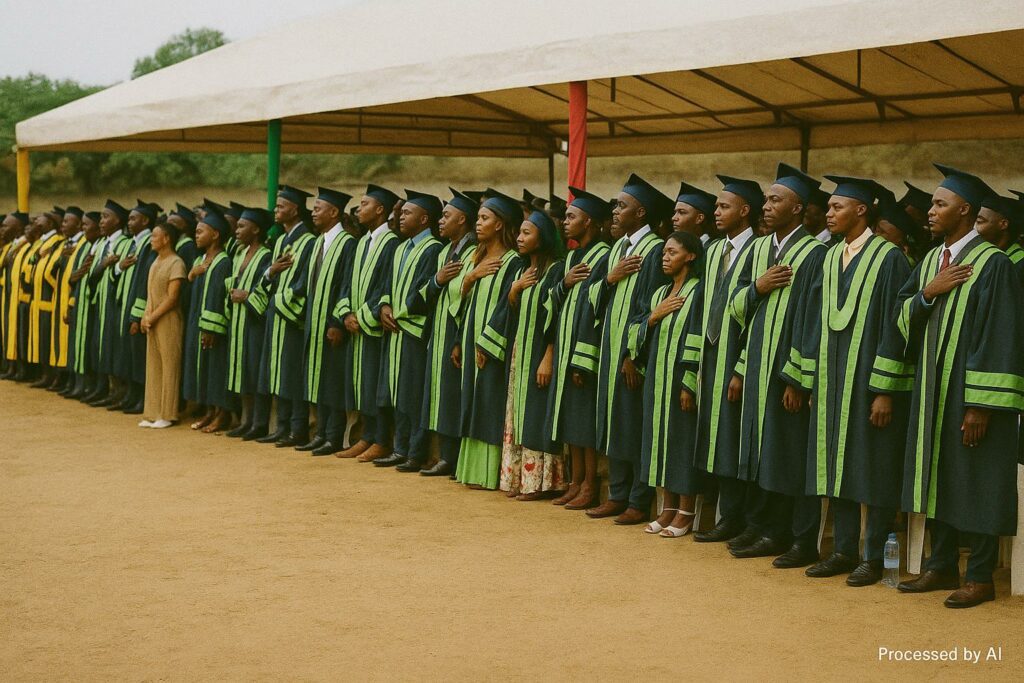Ceremony in Kintélé marks academic milestone
The glass-walled amphitheatre of Kintélé vibrated with a mix of orchestral hymns and ululations as the University Denis Sassou Nguesso, barely three years after its inauguration, released its third cohort into the national talent pool. In the presence of the Prime Minister Anatole Collinet Makosso and senior cabinet members, 405 graduates—294 at licence level and 111 at master level—received parchment embossed with the state seal, an image that quietly underscored the Republic of Congo’s intention to anchor its economic modernisation in academic credentials (ACI, 26 July 2024).
Breakdown of licencés and masters
Behind the celebratory choreography lies a granular portrait of performance. The Institut supérieur des sciences géographiques, environnementales et de l’aménagement posted 92 successful licences out of 100 candidates and an unblemished 30-for-30 record in master programmes. The Faculté des sciences appliquées followed with 113 licences and 31 masters, while the Institut supérieur d’architecture, d’urbanisme, de bâtiment et des travaux publics achieved a rare statistical sweep, graduating every one of its 123 candidates. Cumulatively, the university’s success rate hovers above 97 percent, a figure that compares favourably with the 85 percent regional average recorded by the Conseil africain et malgache pour l’enseignement supérieur (CAMES, 2023).
Excellence metrics underscore academic rigor
Meritocracy retained centre stage as Ngantso Anne Laure Emmanuelle, laureate in architecture with a 15.53 grade-point, and Malonga Mpoussika Beldon, master in landscape design at 15.41, were declared majors. Their distinction resonates with the university’s policy of absorbing top achievers as teaching-research assistants, a move confirmed by the rector, Professor Ange Antoine Abena, who framed it as a ‘virtuous recycling of talent into the very laboratories that shaped it’ (Udsn communiqué, 2024).
Executive message links education and emergence
Addressing the auditorium, Prime Minister Makosso wove the graduates’ success into the national tapestry of the Plan national de développement 2022-2026, insisting that “human capital is the decisive vector of our emergence.” Minister of Higher Education Emmanuelle Delphine Edith echoed the sentiment, noting that the institution had “reached cruising speed”, a rhetorical upgrade from the soft-launch language used during its inaugural intake. The unanimity of tone aligned with the government’s broader narrative that a knowledge economy is not an accessory but an imperative.
Institutional consolidation and research agenda
The university’s internal architecture is evolving alongside its student numbers. A new School of Mines, Hydraulics and Energy is slated to enrol its first cohort in the upcoming semester, complementing an already funded suite of geospatial laboratories. Moreover, a four-pillar research strategy—ranging from coastal resilience to digital fabrication—has been endorsed by the Scientific Council, accompanied by quality-assurance benchmarks in line with ISO 21001 norms (Ministry of Higher Education, 2024). Such scaffolding suggests the institution is transitioning from a teaching-only campus to a research node capable of courting international partnerships.
Applied research addresses national priorities
Master dissertations read like a policy brief catalogue: integrated development planning for Kintélé, coastal-erosion diagnostics in Louango Bay, design of the Ministry of Women’s headquarters, and mobility analytics of transport corridors. By steering scholarship toward immediate national quandaries—rather than abstract themes—the university is positioning itself as a think tank in miniature, capable of informing ministries that currently rely heavily on expatriate consultancies.
From campus to workforce: bridging the gap
The employment horizon remains the crucial test. Student-union president Thierry Ngouama implored state-owned corporations and private conglomerates to absorb the fresh graduates, reminding the audience that unemployment among holders of higher degrees still hovers around 19 percent nationally (National Employment Observatory, 2023). The Prime Minister, responding ad-libitum, alluded to pending fiscal incentives aimed at firms that recruit domestically trained engineers, a policy measure likely to be folded into the next budget session.
Regional context and soft power dividends
A thriving Udsn has ramifications beyond payroll statistics. In Central Africa, where student mobility often flows outward to Morocco, Côte d’Ivoire or France, the ability to retain and attract scholars is increasingly viewed as soft-power currency. Observers at the Economic Community of Central African States hint that Brazzaville’s growing academic infrastructure could serve as a diplomatic asset, enabling educational exchange agreements that sit alongside oil and forestry dossiers.
Sustaining momentum towards 2030 Agenda
Challenges persist: laboratory consumables must be replenished regularly, digital bandwidth expanded, and doctoral pathways clarified. Yet the graduation of 405 students in a single ceremony testifies to institutional resilience. As the applause faded, a banner above the podium read “Capital Humain pour l’Avenir.” Whether that slogan evolves into measurable contribution to the Sustainable Development Goals will depend on continued alignment between academic policy, fiscal allocation and the absorptive capacity of the national economy. For now, the tassels that swayed in Kintélé symbolise a forward step in the Republic of Congo’s deliberate march towards a knowledge-driven horizon.

